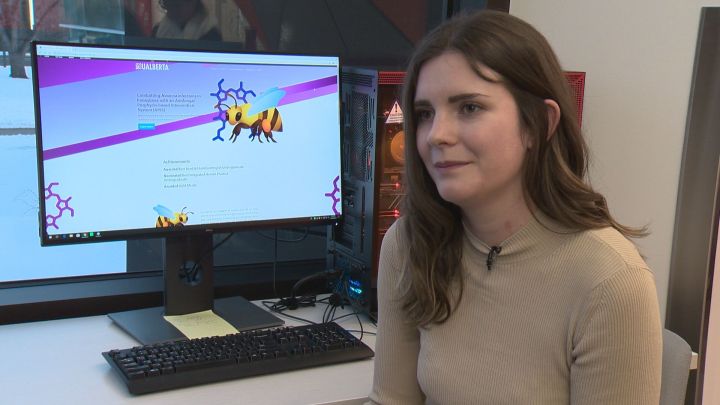Students at the University of Alberta have created a probiotic that could help save the local honeybee population – and in turn, your avocado toast.

Many of us know our bees need help, and the team of students say they may have some answers about how to help them.
“The bees are in trouble, but I don’t think a lot of people know specifically what’s up with the bees,” said Julia Heaton, a science student at the university.
Heaton and her team have genetically engineered a new medicine that will fight a parasitic fungus called Nosema. The fungus plagues the digestive systems of honeybees and is deadly enough to wipe out entire hives.
“It’s almost like the common cold of a bee population, so it makes them more susceptible to everything else,” Heaton told Global News on Thursday. “It makes them weaker, it makes them more susceptible to other infections and it makes it harder for them to survive the winter.”

Get daily National news
READ MORE: Pesticides linked to death of the bees to be phased out of Canada within three years, sources say
Since previous treatments for the fungus are no longer available, the students want to take their research to the next level as quickly as possible.
In 2016, Alberta produced more than 40 per cent of the country’s honey, valued at roughly $60 million. In addition to being part of a multimillion-dollar industry, Heaton said bees are essential to the food chain.
“What we may not realize is just how important bees are to the pollination of many of the foods that we eat,” she said. “Some foods are pollinated by bees only, those are things like avocados and blueberries that we wouldn’t have if we didn’t have bees.”
- Real Canadian Superstore fined for ‘misleading’ Product of Canada displays
- Danielle Smith promises Alberta referendum over immigration, Constitution changes
- ‘No reason to continue discussing’: Ontario mayor wants Andrew’s name dropped
- Canadian Tire says Triangle Rewards are its ‘linchpin’ for growth













Comments
Want to discuss? Please read our Commenting Policy first.